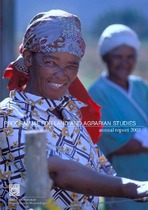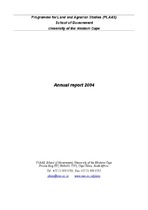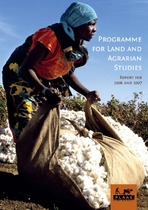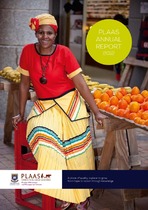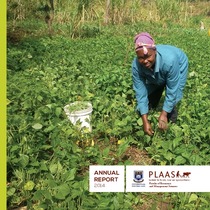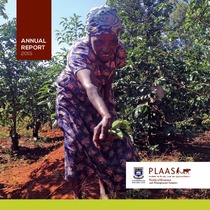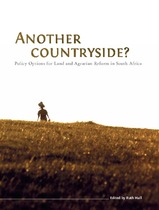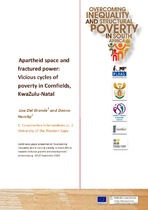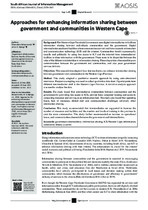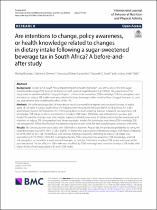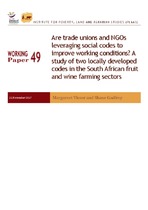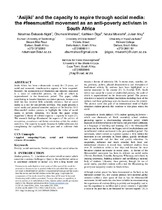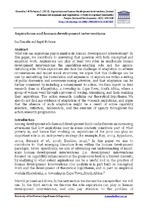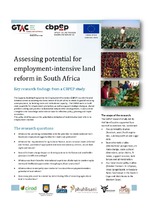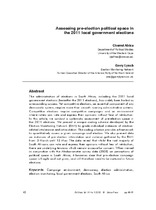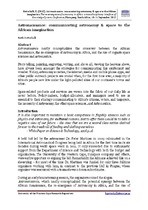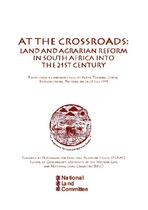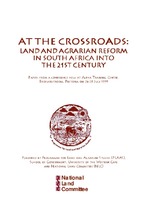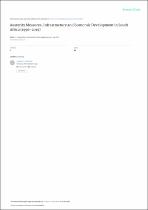Browsing Faculty of Economic and Management Sciences by Title
Now showing items 38-57 of 1094
-
Annual report 2003
(Institute for Poverty Land and Agrarian Studies (PLAAS), 2004)Applied social science researchers generally want to see their research influence policy and practice; those of a more activist bent seek to ‘change the world, not simply to interpret it’.1 In its mission statement ... -
Annual report 2004
(Institute for Poverty Land and Agrarian Studies (PLAAS), 2005)The wider context of our research and training, and the ultimate rationale for establishing and maintaining a centre such as PLAAS, is the key challenge of deeply entrenched poverty, as well as the inequality to which ... -
Annual report 2006-2007
(Institute for Poverty Land and Agrarian Studies (PLAAS), 2008)Over the past two years the contradictions inherent in South Africa’s post-apartheid growth and development path have become increasingly evident. Growth has not managed to reduce very high levels of unemployment to a ... -
Annual report 2012
(Institute for Poverty Land and Agrarian Studies (PLAAS), 2013)In much of the global South the instability in global financial systems continued to have dire effects – and there were many worrying signs that the serious food price inflation the world experienced in 2008 would return. ... -
Annual report 2014
(Institute for Poverty Land and Agrarian Studies (PLAAS), 2015)Very often, in our work at PLAAS, we encounter two common misunderstandings about what it is that we do and why it is important. One common misunderstanding is that we are some sort of technical agricultural education ... -
Annual report 2015
(Institute for Poverty Land and Agrarian Studies (PLAAS), 2016)The year 2015 was a momentous one for PLAAS. It marked twenty years since the day that PLAAS started off as an organisation with some generous start-up funding from the Ford Foundation. PLAAS started life small: initially ... -
Another countryside? Policy options for land and agrarian reform in South Africa
(Institute for Poverty, Land and Agrarian Studies, University of the Western Cape, 2009)Land reform in South Africa is a political project that has foundered. For years, the process has been variously described as being ‘in crisis’, ‘at a crossroads’, ‘at an impasse’ or simply ’stuck’. This still seems as ... -
Another countryside? Policy options for land and agrarian reform in South Africa
(Institute for Poverty Land and Agrarian Studies (PLAAS), 2009)Land reform in South Africa is a political project that has foundered. For years, the process has been variously described as being ‘in crisis’, ‘at a crossroads’, ‘at an impasse’ or simply ’stuck’. This still seems as ... -
Apartheid space and fractured power: Vicious cycles of poverty in Cornfields, KwaZulu-Natal
(Institute for Poverty Land and Agrarian Studies (PLAAS), 2010)Apartheid space and fractured power: vicious cycles of poverty in Cornfields, KwaZulu-Natal A neglected area in the literature on structural poverty is changing land tenure relations and the disconnect with planning ... -
Approaches for enhancing information sharing between government and communities in Western Cape
(AOSIS, 2021)The Western Cape Provincial Government uses digital intermediaries to facilitate information sharing between individuals, communities and the government. Digital intermediaries are shared facilities where communities can ... -
Are intentions to change, policy awareness, or health knowledge related to changes in dietary intake following a sugar-sweetened beverage tax in South Africa? A before-and after study
(BMC, 2022)Background In April 2018, South Africa implemented the Health Promotion Levy (HPL), one of the first sugarsweetened beverage (SSB) taxes to be based on each gram of sugar (beyond 4 g/100mL). The objectives of this study ... -
Are trade unions and NGOs leveraging social codes to improve working conditions? A study of two locally developed codes in the South African fruit and wine farming sectors
(Institute for Poverty, Land and Agrarian Studies, University of the Western Cape, 2017-11)The paper explores one aspect of the food security question, namely the livelihoods of farmworkers, which ultimately speaks to the sustainability of farms and the provision of food. It focuses on the emergence of locally ... -
'Asijiki' and the capacity to aspire through social media: The #feesmustfall movement as an anti-poverty activism in South Africa
(ACM, 2016)South Africa has been a democratic country for 21 years, yet racial and economic transformation appears to have stagnated. Recently, the accumulation of frustration and injustice amounted to a wave of student-led protests, ... -
Aspirations and human development interventions
(Taylor & Francis, 2013)What role can aspirations play in small-scale human development interventions? In this paper, we contribute to answering that question with both conceptual and empirical work. Aspirations can play at least two roles in ... -
Assessing potential for employment-intensive land reform in South Africa: Key research findings from a CBPEP study
(GTAC, 2020)The Capacity Building Programme for Employment Promotion (CBPEP) is an EU-funded initiative aimed at assisting the Government of South Africa to attain its goal of reducing unemployment, by building state and institutional ... -
Assessing pre-election political space in the 2011 local government elections
(Unisa Press, 2012)The administration of elections in South Africa, including the 2011 local government elections(hereafter the 2011 elections), has widely been hailed as a resounding success. Yet competitive elections, an essential component ... -
Astronaissance: Communicating astronomy & space to the African imagination
(2013)Astronaissance neatly conceptualizes the crossover between the African Renaissance, the re-emergence of Astronomy in Africa, and the rise of cognate space sciences and astronautics. Story-telling, painting, engraving, ... -
At the crossroads: Land and agrarian reform in South Africa into the 21st century
(Institute for Poverty, Land and Agrarian Studies, University of the Western Cape, 1999)The land sector has always been characterised by lively and public arguments over policy, and some of the central and recurring themes of the previous five years of debate were expected to surface at the conference. ... -
At the crossroads: Land and agrarian reform in South Africa into the 21st century
(Institute for Poverty Land and Agrarian Studies (PLAAS), and National Land Committee (NLC), 2000)These conference proceedings are published at a time of extraordinary fluidity and uncertainty as to the future of the ambitious programmes of land and agrarian reform1 initiated by the first democratic government in 1994. ... -
Austerity measures, infrastructure and economic development in South Africa (1996–2019)
(Vilnius University Press, 2023)The paper aims to establish whether austerity measures promote economic development, improve infrastructure development, and whether they exacerbate infrastructure backlogs. The methodology used is a quantitative research ...

